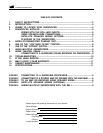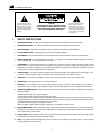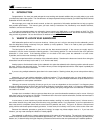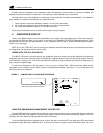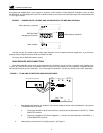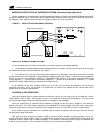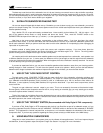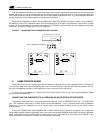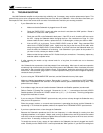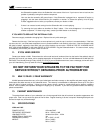
The best way to set the level of the subwoofer is to do it by ear, listening over several hours or days to familiar recordings.
Make adjustments to the level in small increments, depending on whether the bass level sounds too high or too low. Of course,
you can always deliberately set the level higher or lower than flat if you need a higher bass level (especially for cinema or
television sources) or if you don't want to disturb your neighbors.
5. SATELLITE/SUBWOOFER PHASING TEST
You are now almost finished with the basic set-up. But before you can sit down to enjoy your new subwoofer, you need to
perform one simple Phasing Test. This test insures optimum sound in the critical bass frequencies where your subwoofer and
satellite speakers overlap.
Play a familiar CD, LP, or tape with steady, consistent bass. Listen carefully to the mid-bass (70 - 100 Hz) region — the
part of the spectrum where electric or string basses and drums are found. Then, move the "PHASE" switch on the
SUBWOOFER's back panel from either up (+) or down (—) to the opposite position.
Now listen to the same musical passage, concentrating on the mid-bass region. If you hear less bass, the original
connections were correct. If you hear more bass, the new connections are correct. If you have two subwoofers, perform one
test for each subwoofer. When you perform each test, make sure the other subwoofer is not operating by either unplugging its
input cable or its power cord.
Another method of setting phase uses a pink noise source and a spectrum analyzer. If you have these, place the
microphone at the main listening position and look at its display in the mid-bass region of 70 - 100 Hz. The wiring/ switch
position showing the most output in that region has the correct phase.
You need to perform this test because when satellite speakers are located separate from a subwoofer, each speaker is at
a different distance from your ear. In some cases, the difference will be just enough so that the output from the subwoofer
arrives out of phase with the output of the satellites. When this happens, that critical mid-bass is actually cancelled. You should
re-do this test any time you move your speakers.
If you want to experiment further, you can move the satellite speakers either towards or away from your listening position,
making changes in small increments. This will focus the system's sound to its optimum. When you hear the best balance
between stereo image localization and maximum impact and output in the mid-bass, you have the ideal location.
6. USE OF THE "LOW PASS FILTER" CONTROL
The back panel control "LOW PASS FILTER" sets the upper rolloff point of the subwoofer, eliminating mid-bass and
midrange that are being reproduced by your satellite speakers. The control is a means of fine-tuning the transition between
your subwoofer and satellite speakers, and it provides a rolloff of 12 dB/octave up to 125 Hz, where the filter shifts to 36
dB/octave. In most systems, including M&K satellites, 85 Hz gives the best blend. If you don't want to experiment, set the
control at 85 Hz.
The goal is to get a balanced acoustic output in your room. This is not necessarily the same as flat electrical output.
Rooms typically reinforce bass frequencies around 100 Hz, so by leaving an electrical gap, you may actually get a smooth
acoustical response where it matters, in the room.
Think of this control as a mid-bass fine tuning adjustment that you set to achieve the best transition between the satellite
speakers and the subwoofer. When you hear a smooth sound overall, well balanced between the deep bass and the rest of
the audible spectrum, the control is set properly.
7. USE OF THE "BYPASS" SWITCH
(Recommended with Dolby Digital & THX components)
If you have a THX, Dolby Digital, or DTS component with a built-in Low-Pass filter as part of its subwoofer output, or if you
are using a separate Electronic Crossover, set the “VARIABLE” / “BYPASS” switch on the back of the subwoofer to “BYPASS”
position. This bypasses the internal low-pass filter so that there is no interaction between the subwoofer’s filter and your
component’s filter. If you have any questions regarding the filters, please contact your M&K dealer or the M&K factory.
8. USING MULTIPLE SUBWOOFERS
Using two (or more) subwoofers in your system gives you the ultimate in bass performance. You'll hear improved impact
and definition, as well as greater output and dynamic range. See Section 4 on page 5 for more information.
POWERED SUBWOOFER
8




